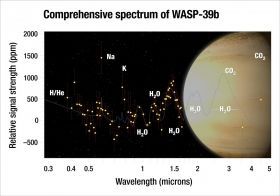
Melting icecaps, mass flooding, megadroughts and erratic weather are no laughing matter. However, a new study shows that humor can be an effective means to inspire young people to pursue climate change activism. At the same time, fear proves to be an equally effective motivator and has the added advantage of increasing people’s awareness of climate change’s risks.
>> Read the Full Article

Much like detectives study fingerprints to identify the culprit, scientists used NASA’s Hubble and Spitzer space telescopes to find the “fingerprints” of water in the atmosphere of a hot, bloated, Saturn-mass exoplanet some 700 light-years away. And, they found a lot of water. In fact, the planet, known as WASP-39b, has three times as much water as Saturn does.
>> Read the Full Article

Large day-to-day swings in temperature were associated with significantly more heart attacks in a study being presented at the American College of Cardiology’s 67th Annual Scientific Session. Given that some climate models link extreme weather events with global warming, the new findings suggest climate change could, in turn, lead to an uptick in the occurrence of heart attacks, researchers said.
>> Read the Full Article
More and more people are surviving cancer. Yet support for people who survive cancer and the research that underpins their care is insufficient, particularly when it comes to non-medical issues. A new special issue of the Journal of Cancer Policy, which will be published in March following the 3rd EORTC Cancer Survivorship Summit to be held in Brussels on March 1st and 2nd, shines a light on the issues and calls for more long-term research, better cross-analysis of different cancer types and better support for those who survive the disease.
>> Read the Full Article

Native wildflowers were surprisingly resilient during California’s most recent drought, even more so than exotic grasses. But signs of their resilience were not evident with showy blooms aboveground. Rather, they were found mostly underground, hidden in the seed bank, according to a study from the University of California, Davis.
>> Read the Full Article

 ENN
Environmental News Network -- Know Your Environment
ENN
Environmental News Network -- Know Your Environment